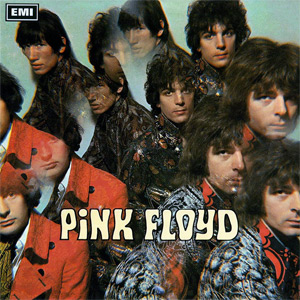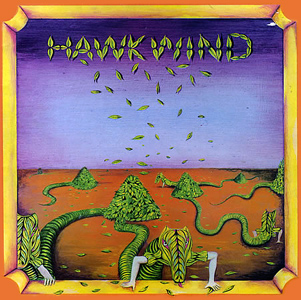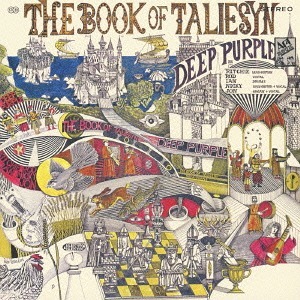
The Bevis Frond is an English rock band formed in 1986 in Walthamstow, London, England. The band is fronted by Nick Saloman and has recorded many singles and albums on various independent labels.

The Piper at the Gates of Dawn is the debut studio album by English rock band Pink Floyd, released on 4 August 1967 by EMI Columbia. It is the only Pink Floyd album made under the leadership of founder member Syd Barrett ; he wrote all but three tracks, with additional composition by members Roger Waters, Nick Mason (drums), and Richard Wright. The album followed the band's influential performances at London's UFO Club and their early chart success with the 1967 non-album singles "Arnold Layne" and "See Emily Play".

Hawkwind is the debut album by Hawkwind, released in 1970, originally on Liberty Records, later reissued on Sunset Records. This album is historic since it is one of the first space rock LPs.

Shades of Deep Purple is the debut album by the English rock band Deep Purple, released in July 1968 on Tetragrammaton in the United States and in September 1968 on Parlophone in the United Kingdom. The band, initially called Roundabout, was the idea of former Searchers drummer Chris Curtis, who recruited Jon Lord and Ritchie Blackmore before leaving the project. The Mk. I line-up of the band was completed by vocalist/frontman Rod Evans, along with bassist Nick Simper and drummer Ian Paice, in March 1968.

"Have a Cigar" is the third track on Pink Floyd's 1975 album Wish You Were Here. It follows "Welcome to the Machine" and on the original LP opened side two. In some markets, the song was issued as a single. English folk-rock singer Roy Harper provided lead vocals on the song. It is one of only three Pink Floyd recordings with a guest singer on lead vocals, the others being "The Great Gig in the Sky" (1973) with Clare Torry and "Hey Hey Rise Up" (2022) with Andriy Khlyvnyuk. The song, written by Waters, is his critique of the rampant greed and cynicism so prevalent in the management of rock groups of that era.

Deep Purple, also referred to as Deep Purple III, is the third studio album by the English rock band Deep Purple, released in June 1969 on Tetragrammaton Records in the United States and only in September 1969 on Harvest Records in the United Kingdom. Its release was preceded by the single "Emmaretta" and by a long tour in the UK, whose dates were interspersed between the album's recording sessions.

"Interstellar Overdrive" is an instrumental composition written and performed by the English rock band Pink Floyd. The song was written in 1966 and is on their 1967 debut album, The Piper at the Gates of Dawn, clocking in at almost ten minutes in length. It features long sections of free-form instrumental improvisation reflective of the group's live performances.

The Book of Taliesyn is the second studio album by the English rock band Deep Purple, recorded only three months after Shades of Deep Purple and released by Tetragrammaton Records in October 1968, just before their first US tour. The name for the album was taken from the 14th-century Book of Taliesin.

The Telescopes are an English noise, space rock, dream pop and psychedelic band formed in 1987 by artist, composer, and musician Stephen Lawrie, with band members David Fitzgerald and Joanna Doran joining later. The band's line-up is in constant flux; there can be anywhere between 1 and 20 members on a recording.

Beau, born Christopher John Trevor Midgley, is a British singer-songwriter and twelve-string guitar player, who first became known in the late 1960s through his recordings for John Peel's Dandelion Records label. He released two albums on Dandelion – Beau (1969) and Creation (1971), plus the single "1917 Revolution" which had greater success abroad than it did in the United Kingdom. "1917 Revolution" is said to have been the inspiration for America's "A Horse with No Name".
Touch was a 1960s American progressive rock band who recorded one album, 1968's eponymous Touch. They consisted of John Bordonaro, Don Gallucci, Bruce Hauser, Jeff Hawks (vocals), and Joey Newman AKA Vern Kjellberg.
The Chemistry Set are a psychedelic band from London, United Kingdom. Composed of former members of bands in the late 1980s neo-psychedelic scene, the group received regular airplay on John Peel's show and appeared on Tony Wilson's BBC2 show, 100%.
The Linus Pauling Quartet was an American psychedelic rock group which specializes in a specific subgenre known as "Texas Psych", but frequently dabbles also in garage rock, stoner rock, punk rock, and heavy metal at various points throughout their discography. The LP4 was formed in 1994 by veterans of various local groups from the Houston and Clear Lake areas of Texas. Born of the same musical cauldron that birthed such renowned Texas Psych favorites as The Mike Gunn, Dry Nod, and Schlong Weasel, bands which also included later members of Charalambides and Dunlavy, the LP4 got off the ground when guitarist Ramon Medina and bassist Stephen Finley recruited drummer Larry Liska and singer/guitarist Clinton Heider and the quartet began writing and recording songs for their first album, Immortal Chinese Classics Music, released in 1995 on their own Worship Guitars label. The album surprisingly earned considerable attention beyond their native Houston, garnering notable reviews in several music magazines such as Q Music, Factsheet Five, Alternative Press, Crohinga Well, and Ptolemaic Terrascope, and featured "The Linus Theme" and "Hamburger Girl", two songs which came to define the band's early years, and which the LP4 revisited many times throughout their career.
Dantalian's Chariot were a British psychedelic rock band formed in 1967, led by keyboardist and bandleader Zoot Money, and also featuring Andy Summers. They are best remembered for their single "Madman Running Through the Fields", and for their live performances, which featured early psychedelic light shows. The band would all wear white robes and kaftans in concert, with all of their equipment painted white, to heighten the effect of these light shows. The group disbanded in April 1968, with Money going on to join Eric Burdon & The Animals and Summers joining Soft Machine.

Alison O'Donnell is an Irish musician, solo and band singer-songwriter. Born Alison Bools in Dublin to an English mother and Irish father, raised in Dalkey and educated at Holy Child Killiney.
Mark Lewis Fry is an English painter and psychedelic folk musician. He is best known for his album Dreaming with Alice, released in 1972, which has been hailed as a psychedelic folk classic by critics and a diverse range of musicians.

Tony, Caro and John is a British psychedelic folk trio who recorded the album All on the First Day in 1972. The threesome took much of their inspiration from the Incredible String Band's eclectic strain of psychedelic folk, although songwriter and singer Tony Doré's compositions had a sound and voice of their own. The All Music Guide writes of the trio, "Tony, Caro and John were also wont to embellish their basic male-female vocal harmonies, and one electric guitar-one-acoustic-guitar-bass line-up, with weird touches of hippie psychedelia in the occasional electronic effects, tinkling percussion, flageolet, wah-wah, and violin... Slightly sardonic but cheerfully playful, and with strong tunes effectively blending major and minor modes, they're more approachable for listeners with conventional rock and pop tastes than the Incredible String Band, or Incredible String Band-like bands of the period, such as Forest and Dr. Strangely Strange."
Rob Clarke is a British singer-songwriter. Described by AltSounds as 'more than just a man and a guitar' he is influenced by a range of genres including folk music, country music and psychedelic rock as well as formative experiences growing up in Liverpool, Nottingham, Huddersfield, Skipton and Aberdeen.

Psychotropia is the debut album by English psychedelic musician Nick Nicely, first released as an LP by Tenth Planet in 2003 and as a CD by Castle Music in 2004. Nicely had started fusing psychedelic and electronic music in the late 1970s, and in the early 1980s he released two singles, "DCT Dreams" and "Hilly Fields (1892)". While the singles were critically acclaimed, they were commercial failures, which partly contributed to Nicely's retirement from the public eye shortly after. While his works were being praised by several of his contemporaries, he continued to record material into the mid-1980s, and then again in the late 1990s.

Fruits de Mer Records is a British independent record label based in Walton-on-Thames, Surrey, England, established by Keith Jones and Andy Bracken in 2008. It releases psychedelic rock, psychedelic folk, folk rock, space rock and krautrock music, with an international roster of artists spanning from the 1960s to the present.















